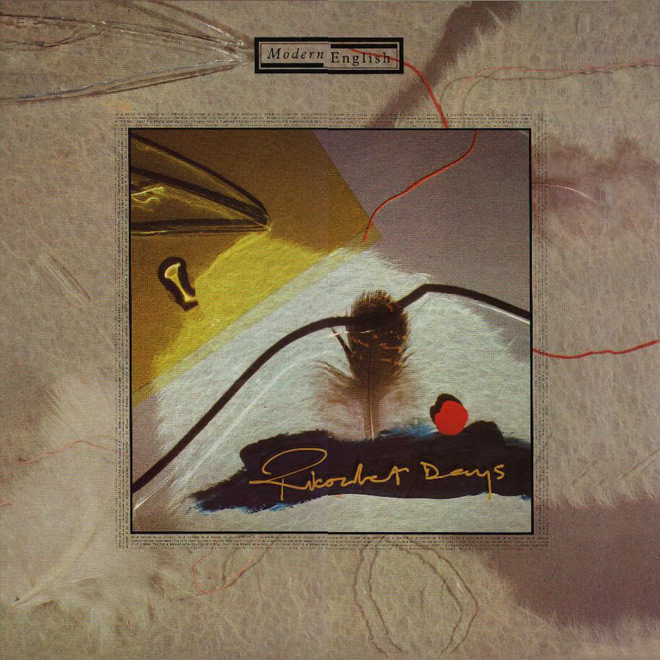As the pioneering, 1979-forming, England-originating band Modern English progressed, its music became more instrumentally intricate and Classical-inspired. To classify the band at that point as New Romantic was very befitting. The third album, Ricochet Days, may be regarded as the peak of the band’s musicality—a bittersweet mélange of basic Rock tools (electric guitars, bass, drums, and synthesizers) and Classical instruments (piano, violin, cello, oboe, and horns); the song structures were well-arranged and the instruments meticulously layered. The album featured also Kate St. John (on oboe), a primary member of another Classical New Wave group, The Dream Academy (“Life in a Northern Town”).
Released in 1984 via 4AD Records, Ricochet Days opened with the driving, glowing, and Romantic Gothic sound of “Rainbow’s End.” The dark and ominous predisposition—a marked transition from its predecessors—continued with “Machines”—dream-like state, emanating sonic sparkles of meshes and laces. Then there spun the infectiously sweet “Spinning Me Round”—one of the album’s highlights—catchy, happy, and brimming with melting nostalgia.
The title-track then trickled its hypnotic knit-work of ornate instrumentation and orchestration, as well as infusing the gloom and doom that was triumphant in the band’s debut release. Following next was Modern English’s perhaps second most-popular song, the heartrending and nicely arranged “Hands across the Sea,” whose having also charted quelled the detractors’ claim that the pioneering Post-Punk / New Wave band was just a one-hit wonder. Longtime fans will surely wave their hands up in the air and drown their sentiments in the ocean of love as they hear this track over and over again.
The initiated would definitely recognize in “Blue Waves” the trademark sound of Modern English—angular rhythm guitars, repetitive and patterned lead-guitar melodies, melodic bass lines, catchy choruses, and memorable keyboard parts intricately woven into each other; in fact, it came across as a sonic twin of the band’s ubiquitous and most successful hit single “I Melt with You.” The seven-minute penultimate track, “Heart” best represented the band’s New Romantic sound—flute, oboe, clarinet, violin, cello, waltzing gracefully with each other in woodwind wonder and string spectacle; building up from the distant Common-Practice Period of the mid-1600s and 1900s to the revolutionary Post-Punk/New Wave Era of the late ’70s and early ’80s.
Finally, Modern English—Robbie Grey (vocals, guitar), Gary McDowell (lead guitar), Stephen Walker (keyboards), Michael Conroy (bass, violin), and Richard Brown (drums, percussion)—wrapped up their pièce de résistance with the tubular and steely sound of “Chapter 12,” connecting this third opus effectively with the preceding 1981’s Mesh & Lace and 1982’s After the Snow.
Many music reviewers and even so-called fans dismissed Ricochet Days as a lackluster album, often downplaying it off Modern English’s illustrious discography. What a shame! Such a criminally serious omission! For one, Ricochet Days is obviously well-crafted and full of meticulously orchestrated tracks, combining the elusiveness of Gothic Rock and New Romantic and accessibility of Pop music. Whatever negative anyone had said about Ricochet Days back in the day, only time did tell how the album stood the test of countless stylistic changes and musical revolutions. Thirty-five years later, the music of Ricochet Days remains as romantic and relevant as ever. It may actually be regarded as the heart of the currently active band’s eight-album discography.







Great review Alfie of a seriously overlooked album.
A fantastic record.